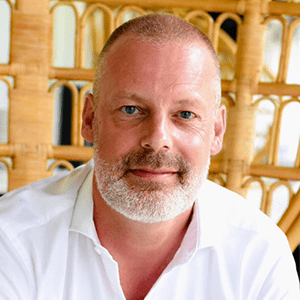Do you give bla bla feedback, or do you care enough to challenge?
Most leaders care about their people, their colleagues and their mission. But many of them are too shy about challenging their fellow leaders. They are not energetically questioning status quo, bringing new perspectives, disagreeing with each other, pushing boundaries, and learning together. Leadership teams need this intense internal sparring, like a football team needs competitiveness in their training; Lame training leads to lame games.
If you truly care, you love to challenge – and be challenged.
When Leaders Do Not Challenge Each Other.
Paradoxically, many leaders shy away from challenging their peers. Instead of clearly formulating their point of view, they “beat around the bush”. Instead of holding each other accountable for performance, they let each other of the hook too easily.
Why does this happen? Some leaders wrap up their opinions in meaningless niceties, because they want harmony and avoid conflict at any cost. Others fear retaliation when they challenge others, because there is an eye-for-an-eye principle in their team. And a few simply don’t care enough. Whatever the reason for not challenging each other, it leads to counter productive silo thinking that reduces cross functional accountability and performance. Is is a downward spiral.
Effective leadership teams constantly spar with each other, as they do not accept to merely continue to do, what they have done. They look for improvements and growth. They debate, disagree, challenge, decide, commit and do. They create an upward spiral of learning and action.
Non-Challenging Leaders Stall The Organization.
When leaders do not challenge each other, it can be seen as a sign of not respecting each other, and not caring enough for each other, to speak the truth. As a result, mediocrity becomes the norm. The rest of the organization sees that “challenging each other” is unnecessary, maybe even unsafe. People play it safe and organizations stall. Comically, the same leaders who initiated this downward spiral, later complain that problems are ignored, collaboration is poor, commitment is low and innovation does not happen.
It’s easy to give support, and much more complicated to challenge constructively with impact.
The Challenger Mentality.
In our High Challenge, High Support leadership development engagements, we evaluate how much support and challenge members of leadership teams give to and receive from each other. On average, leaders rate themselves to provide a balanced and significant level of support and challenge to their peers. But they surprisingly rate that they themselves, receive significantly less challenge than support from their fellow leaders. And they want to be more challenged by their peers.
In this situation, the team needs to develop a challenge code, where they connect caring and challenging in a new way. They need to continue supporting each other, be more incisive in their communication and call each other out if there is too little challenging going on.
5 questions can help teams to close the challenge-gap:
- If we do not challenge each other more, how will our team and business look like 1 year from now?
- What do I gain, when someone is challenging me?
- What is my contribution to my counterpart, when I challenge her/him?
- What do we need from each other, to make constructive challenge the norm in our team?
- How do we go about it, when we feel someone is not challenging enough?
Leaders have an obligation to challenge each other, and a right to be challenged by each other. It is the only way they can grow individually and as a team, and it is an important signal for the rest of the organization, when their leaders demonstrate how to constructively challenge one another.
Challenge With Love, For Impact.
To create positive impact, it is necessary to challenge with a sense of “love”. The goal is to create new value, and it can be helpful to keep a few “guidelines” in mind:
- Be clear on what your objective with the challenge is, and avoid “beating around the bush”.
- See and interact with your counterpart with unconditional positive regard. Connect with the person, and work the topic. Not the other way around.
- Forget about being “objective”, as it is humanly impossible. It’s OK that your challenge is based on your personal experiences and perceptions, because that is what you are paid for as a leader.
- Seek to build a common path forward, where both parties belong and play a role.
- Seek to build confidence, optimism and hope, as this creates the energy you need to move forward together.
Anyone can Challenge and Lead.
“Leadership” and “challenge” should not only be reserved for leaders by title. They are both activities that can be exercised by anyone in the organization, who is ready to take responsibility and make a difference. Therefore, one of the most important tasks of the leader-by-title, is to empower the organization to do leadership and challenge, beyond their own defined tasks. This is what ultimately makes organziations better places to work, and better companies to do business with.
This article is first published here.
We have launched a Positive Leadership masterclass series, where we will go straight to the core of what make leaders impactful. We focus on practical high challenge and high support methods that you can immediately bring into your leadership practice.
For inquiries, please contact bernie@positivepsych.edu.sg.
Henrik Kofod-Hansen has more than 20 years of experience as a corporate executive and senior leader in Asia and Europe, during which he experienced the insufficiency of traditional company cultures, leadership, and development strategies. To enable better leadership and organisational thriving, he dedicated himself to utilising the science and interventions within positive organisational psychology to enable better leadership and organisational thriving. Henrik holds an MSc of Applied Positive Psychology and advanced degrees in Organisational Psychology & Leadership, as well as in Psychotherapy and Counselling. He is an experienced and trained Co-active® coach, and an Organisational Relationship Systems Coach®.



